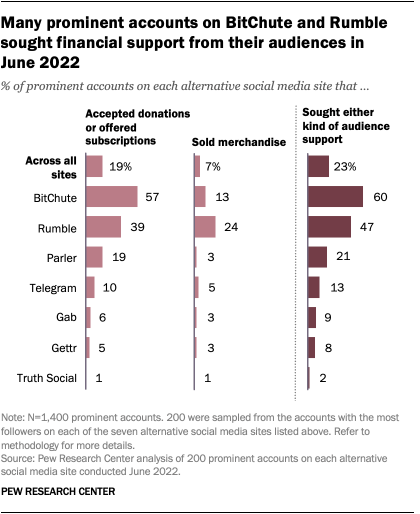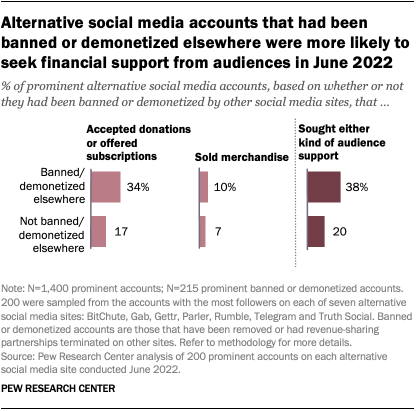As alternative social media sites have gained attention over the past few years, a notable share of the prominent accounts that post content on these sites have turned to their audiences for financial support, according to a new Pew Research Center analysis of 2022 data.
This Pew Research Center analysis explores how many prominent accounts on alternative social media sites turn to donations, subscriptions and merchandise, and who is financially supporting these accounts. It is based on an October 2022 Center study that examined seven alternative social media sites – BitChute, Gab, Gettr, Parler, Rumble, Telegram and Truth Social – using a multi-method approach. Sites were included in the study if they had publicly accessible posts, were mentioned in news media, and had at least 500,000 unique visitors in December 2021.
The survey portion of this analysis was conducted May 16-22, 2022, among 10,188 U.S. adults. Everyone who completed the survey is a member of Pew Research Center’s American Trends Panel (ATP), an online survey panel that is recruited through national, random sampling of residential addresses. This way nearly all U.S. adults have a chance of selection. The survey is weighted to be representative of the U.S. adult population by gender, race, ethnicity, partisan affiliation, education and other categories. Read more about the ATP’s methodology here. Respondents were asked about their familiarity with each of the seven social media sites studied. Those who reported having heard of these sites were also asked whether they used the sites and got news there, how they felt about them, and more.
The margin of sampling error for the full sample of 10,188 respondents is plus or minus 1.6 percentage points; the margin of sampling error for the 587 alternative social media news consumers is plus or minus 7.0 percentage points.
The audit of alternative social media sites was initially conducted in April 2022. To conduct the analysis, a team of researchers were trained on a set of variables that examined features of each site like its privacy and moderation policies. Researchers reexamined each site from August to September 2022 and updated findings with any changes.
The account content analysis examined 200 prominent accounts on each of the seven sites included in this analysis, for a total of 1,400 accounts. Prominent accounts were sampled from the 5% of accounts with the highest number of followers on each site. A team of trained researchers analyzed these 1,400 accounts to determine who ran the account, along with their political orientation, values and other characteristics. For more detail on how accounts were identified and sampled, read the methodology.
Here are the questions used in the study, detailed tables and the methodology.
Pew Research Center is a subsidiary of The Pew Charitable Trusts, its primary funder. This is the latest analysis in Pew Research Center’s ongoing investigation of the state of news, information and journalism in the digital age, a research program funded by The Pew Charitable Trusts, with generous support from the John S. and James L. Knight Foundation.
About a quarter (23%) of the prominent accounts on the seven alternative social media sites studied sought financial support from their audiences in June 2022, according to the analysis. The Center examined 1,400 prominent accounts – selected from those with large numbers of followers – on BitChute, Gab, Gettr, Parler, Rumble, Telegram and Truth Social, many of which position themselves as alternatives to more established social media sites. Some are linked to high-profile conservatives and other backers. (Parler has been temporarily shut down since April 2023.)

The accounts on these sites most commonly sought financial support in the form of donations and monthly subscriptions. About one-in-five prominent accounts (19%) accepted one-time donations or offered monthly subscriptions, and 7% sold branded merchandise such as T-shirts or mugs.
Even as many Americans say they view these sites negatively, the small but largely satisfied share who regularly get news there provide financial support to these accounts. About one-third of U.S. adults who regularly get news from at least one of the seven sites (36%) said in the May 2022 survey that they had donated to, paid for a subscription with, or bought merchandise from an account they follow on those sites.
Differences by site
Prominent accounts on BitChute and Rumble – two alternative social media sites that are primarily used to share videos – were more likely than those on the other five sites to seek either donations or subscriptions from their audiences, or to have sold merchandise in June 2022. Six-in-ten prominent accounts on BitChute and about half of those on Rumble (47%) did this, while no more than about one-in-five prominent accounts on other sites did. Notably, BitChute and Rumble both share advertising revenue with certain accounts, offering another source of financial support.

Prominent accounts on these two sites were also more likely than those on other alternative social media sites to seek out each type of audience support. Roughly six-in-ten prominent accounts on BitChute (57%) and about four-in-ten on Rumble (39%) solicited donations or offered subscriptions in June 2022. About a quarter of prominent accounts on Rumble (24%) and 13% on BitChute sold merchandise.
In comparison, a 2020 Center study found that 41% of popular YouTube news channels accepted donations, on par with the share of prominent accounts on Rumble that did so.
Audience support for accounts that had been banned or demonetized elsewhere
Overall, 15% of prominent accounts on these seven alternative social media sites had been banned or demonetized on other social media sites. These accounts embraced audience fundraising at higher rates than accounts that had not faced these measures on other sites.

Nearly four-in-ten prominent accounts (38%) that had been banned or demonetized elsewhere sought audience support, compared with two-in-ten prominent accounts that had not faced such measures. Similarly, about a third of banned or demonetized accounts (34%) accepted donations or offered subscriptions, compared with 17% of other prominent accounts. However, merchandise was offered at roughly the same rate: 10% of prominent accounts that had been banned or demonetized elsewhere and 7% of other prominent accounts sold merchandise.
Note: Here are the questions used in the study, detailed tables and the methodology.

